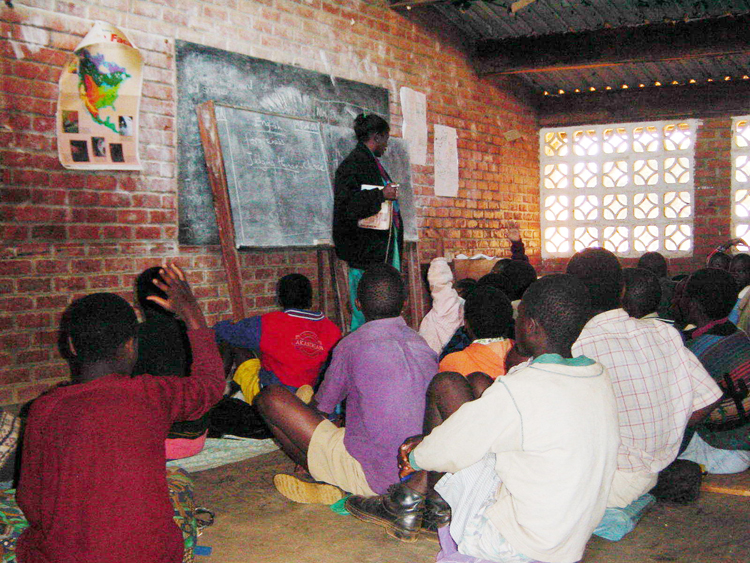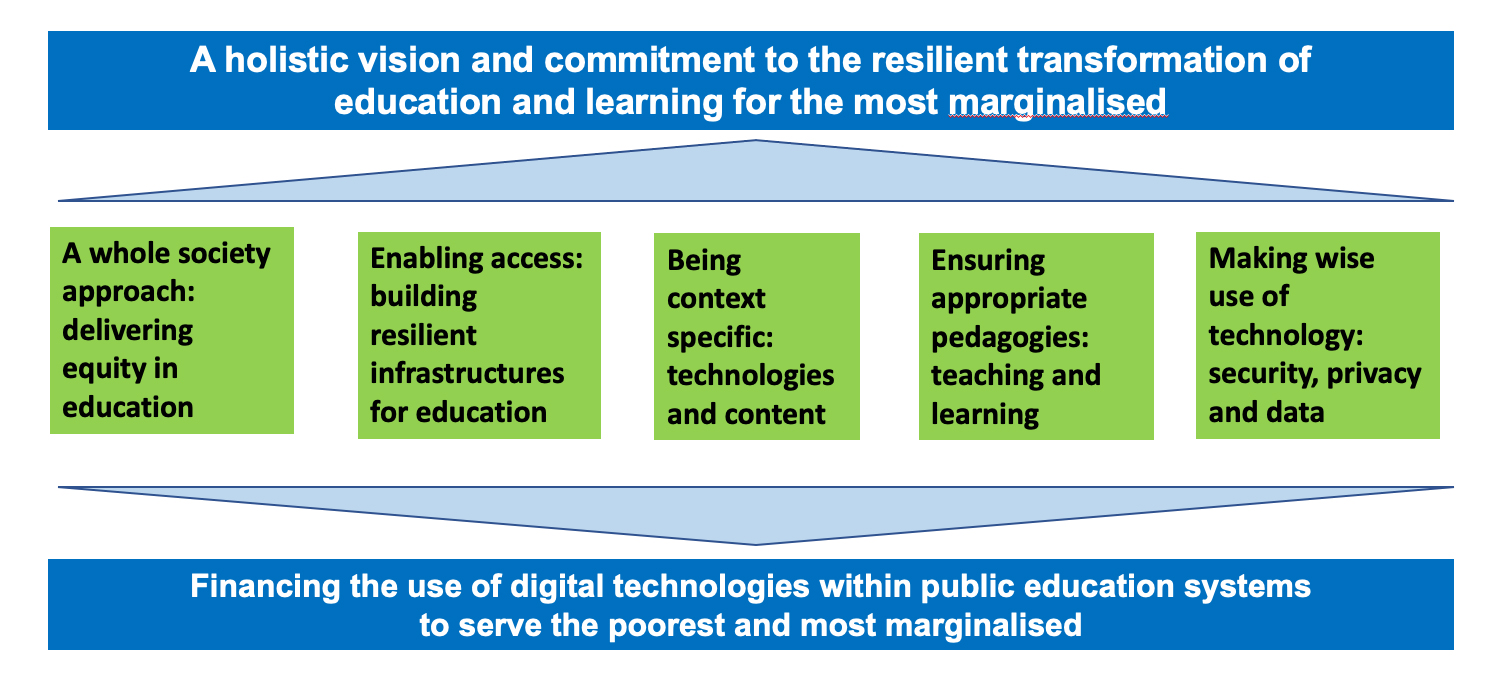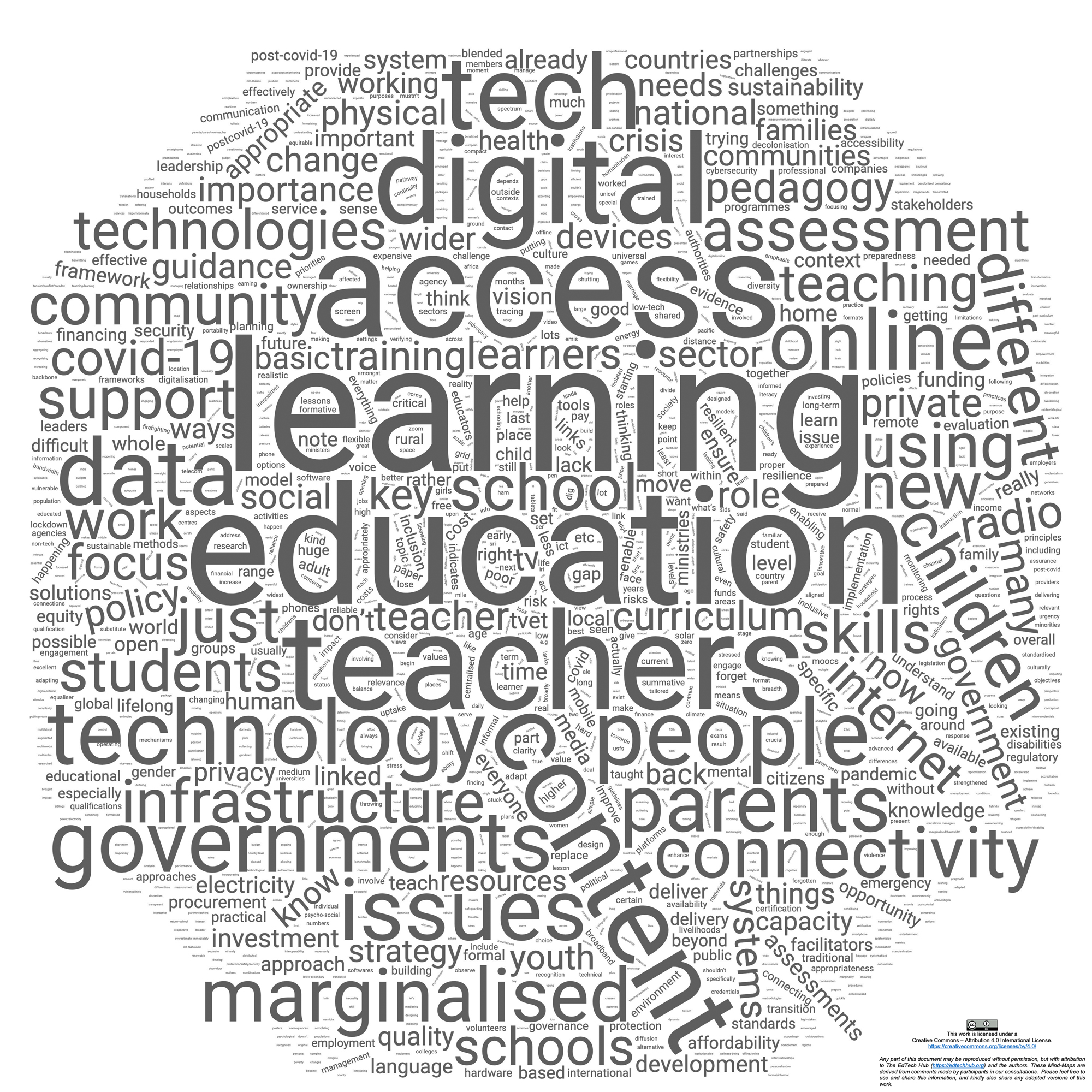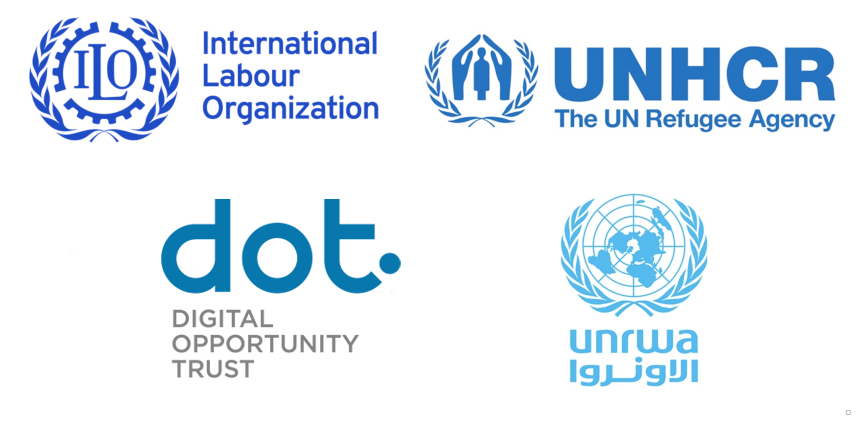Regardless of where you are located in the world, this new Education for the Most Marginalized Post-COVID-19 report is essential reading. It provides comprehensive and concise guidance for educational leaders through the lens of equity. CoSN, the N. American NGO for education technology leaders is proud to have been a collaborator in this excellent resource
Keith Krueger, CEO, CoSN – Consortium for School Networking, Washington, DC
Technology and Education for the Most Marginalised Post-COVID-19 provides pragmatic, practical and insightful strategies, solutions and supportive practices to help and support Governments and educationalists working to empower learners in the most challenging of circumstances. I congratulate Professor Unwin and his team on the publication of this vital report, and for bringing together academia, industry, civil society and Government officials from around the world in the common-purpose of sharing knowledge and good practices for the collective intention of improving educational outcomes and experiences for those students in the most disadvantaged communities.
Caroline Wright, Director General, BESA

Members of the UNESCO Chair in ICT4D led an exciting collaborative initiative between June and September 2020 to produce a Report on practical guidance for governments on using digital technologies to enhance their education systems once the immediate crisis caused by the COVID-19 pandemic has passed (see Summary). This Report is (relatively) short, succinct and practical, and includes a series of brief Guidance Notes addressing the most important actvities that governments need to address to ensure the inclusion of some of the world’s poorest and most marginalised people. This work was funded by DFID (now FCDO) and the World Bank through their EdTech Hub and details of the process through which it was crafted are summarised below.
For details of the report’s launch on 18th December 2020, together with videos and other resources, please see here
The Report
The report was officially published under a Creative Commons Attribution 4.0 (CC BY) license by the EdTech Hub in November 2020, with all material available here (in .pdf format).
However, we are very committed to making the report available in a range of formats to facilitate access and encourage its use. Text files (without images) are available below (in easily editable .docx format) and regular updates will also be made here (please acknowledge and recognise the Creative Commons 4.0 CC BY license should you use this material). Audio recordings of various parts of the report (including the Executive Summary and the Guidance Notes) are also available where indicated.
- Full report (text version in English): Education for the Most Marginalised post-COVID-19: Guidance for governments on the use of digital technologies in education (also available in compressed .pdf format 3.7 MB; for .rtf version please request through our contact form)
- Rapport complet (en français): Éduquer les personnes les plus défavorisées après la COVID-19: orientations destinées aux gouvernements sur l’utilisation des technologies numériques (Translation by Karen Ferreira-Meyers)
The report’s three Acts are available separately below (version 3):
- Act One: Executive Summary
- In English: Executive Summary (and a 40 minute .mp3 audio file of the Executive Summary is also available in English)
- بالعربيةا : لملخّص التنفيذيّ (Translation by The Digital School Initiative, Mohammed bin Rashid Al Maktoum Global Initiatives)
- En français: Résumé exécutif (Translation by Karen Ferreira-Meyers)
- Em português: Resumo executivo (Translation arranged by Cetic.br)
- En español: Resumen Ejecutivo (Translation arranged by Cetic.br)
- Act Two: The Main Report
- Act Three: Guidance Notes
Each of the Guidance Notes is also available as a separate document below (all as at 12 December 2020):
Content
- In the local context – using digital technologies to develop local content (.mp3 audio file read by Azra Naseem)
- Sharing Open Educational Resources (OER) with Creative Commons (CC) open licenses (.mp3 audio file read by Tim Unwin)
Including the poorest and most marginalised
- Digital technologies and girls’ education (.mp3 audio file read by Georg Steinfelder, ICT4D.at)
- Inclusion and accessible learning for people with disabilities
- Supporting the effective use of digital technologies for learning by refugees and displaced persons
- Digital technologies and education in Small Island Developing States (SIDS)
Infrastructural issues
- Ensuring resilient connectivity (.mp3 audio file read by Leon Gwaka)
- Resilient and sustainable energy solutions (.mp3 audio file read by Javier Rua)
Pedagogies
- Involving marginalised young people in the design of their own education (.mp3 audio file read by Kelvin Guma, a member of DOT’s Youth Leaderships Advisory Board, Kenya)
- Prioritising effective and appropriate teacher training (.mp3 audio file read by Tim Unwin)
- Using digital technologies effectively in support of learning and training for employment (.mp3 audio file read by Paul Comyn)
Learning safely and effectively together
- Ensuring rigorous monitoring and evaluation of initiatives using digital technologies in education for the most marginalised
- Ensuring that children are safe when using digital technologies for learning (.mp3 audio file read by Azra Naseem)
- Partnerships with the private sector and civil society
A summary of the core overall recommendations is shown below:

Presentations and video material about the report
Members of the team have also given presentations and written about specific aspects of the report. These are available at:
- Launch programme 18th December 2020
- Tim Unwin’s presentation on 8th December 2020 for Code for Pakistan‘s online Civil Hackathon (4th-13th December 2020) entitles “Challenges in hacking education for the most marginalised” focusing on the tensions between making money and doing good.
- Tim Unwin’s keynote at BESA’s (British Educational Suppliers Association) AGM on 11th November 2020 on the implications of the report for private sector companies (20 minute video).
- Paul West’s presentation on “Reimagining learning delivery through blended learning as a methodology” on 5th November 2020 for Local Government SETA National Skills Deveopment Inauguration webinar,
- Paul West’s presentation on Technology and Education for the Most Marginalised Post-COVID-19, on 6th October 2020 for Creative Commons Chapter Leads.
Reports about our work
- Bevan, L. (2020) Guidance to Governments on the Use of Digital Technologies for Education of the Most Marginalized Following COVID-19, EdTech Connected
Do get in touch with us
Please share your thoughts with us about how these materials can be improved so that they can be made more valuable to governments that are committed to using digital technologies to ensure that they have resilient education systems in place that serve all of their citizens, and especially the poorest and most marginalised. We intend that these documents will be revised periodically, and all suggestions will be gratefully received. Please use our Contact Form to get in touch.
Leadership
Core team
The initiative was led and crafted by a core team consisting of (listed in alphabetical order of first names):
- Alicja Pawluczuk (UNU Institute in Macau)
- Azra Naseem (Aga Khan University, Pakistan)
- Christopher Yoo (Univeristy of Pennsylvania, USA)
- Mohamed Shareef (Permanent Secretary of the Ministry of Communication, Science and Technology, Maldives)
- Paul Spiesberger (Chair of ICT4D.at, Co-Head of BRIC at INSO – TU Wien, Austria)
- Paul West (Creative Commons Chapter, South Africa)
- Tim Unwin (UNESCO Chair in ICT4D, UK)
Advisors
The core team was supported by a distinguished panel of advisors:
- Alex Wong (ITU, Switzerland)
- Bitange Ndemo (ICT Champion and University of Nairobi, Kenya)
- Caroline Wright (DG BESA, UK)
- John Nasasira (Head of 4thIR Task Force, Uganda)
- Keith Krueger (CEO Consortium for School Networking, USA)
- Mike Trucano (World Bank, USA)
- Vanessa Dreier (GIZ, Germany)
- Waleed Al Ali (Mohammed Bin Rashid Global Initiatives, UAE)
EdTech Hub Liaison
Our two key liaison people in the EdTech Hub were:
- David Hollow (Jigsaw Consult and Director, EdTech Hub)
- Jamie Procter (DFID and EdTech Hub)
Support
The following colleagues working with members of our core team or advisers also contributed very usefully to our deliberations:
- Ettie Unwin (Imperial College, London, UK)
- Leon Gwaka (Univeristy of Pennsylvania, USA)
- Müge Haseki (Univeristy of Pennsylvania, USA)
Modalities and methodology

Our work began in June 2020 and drew largely on an extensive consultation process to identify the main priorities on which our Report should concentrate. We worked with groups from Civil Society and International Organisations, the Private Sector, Governments, UN Agencies and Academics, as well as regional consultations from Africa, Asia/Pacific/Middle East and the Americas to help shape our recommended priorties. We would very much like to thank those who contributed to these consultations and crafted the mind-maps available below. Fuill details of the methdology are available in Annex 1 of the full report.
Consultation output mind-maps

The outputs of our consultations were in the form of co-created mind-maps produced by the participants, and these were first made available here on 7th July 2020 under a Creative Commons CC BY Licence through the links below. Each group was asked to identify their top priority recommendations to governments for using digital technologies to enhance learning by the most marginalised in a post-COVID-19 context:
- Academics and the EdTech Hub
- Africa
- Americas
- Asia, Pacific and Middle East
- Civil Society and International Organisations
- Government officials past and present
- Private Sector
- UN Agencies
- UN Agencies that contributed to the HLCP 2019 paper on the future of education and learning for all
These mind-maps can be summarised in the word map below prepared by Paul Spiesberger, which represents the frequency of words included in all of these mind-maps.

As well as these consultations, we also interviewed a small number of people who provided us with additional specific insights. In total, 43 women and 44 men from 34 countries contributed to our thoughts in crafting the Report and Guidance Notes.
The Report and Guidance Notes
Our final Report and Guidance Notes are being made freely available above through a Creative Commons CC BY license, but we also shared some of our evolving outputs here for comment, feedback and use. The initial Report is being published in both English and French, and we are also seeking support to make it available in other languages. We will also be making available relevant infographics and slide-deck templates relating to the guidance notes and core themes. We are very grateful to all of the individuals and organisations who have contributed to and co-authored parts of these outputs.
Earlier drafts of all parts of the report and its Guidance Notes were made available here, and many of the comments received from people who read them have been incorporated into the final report.
We are delighted to have had contributions and support from the following organisations in crafting some of the Guidance Notes, and are very grateful to all of the individuals within them who drafted material for us:


Contact us
Please use our Contact Page to get in touch, or if you know our e- mail addresses do just send us an e-mail.
Please use #Emmpostcovid19 (Education for the Most Marginalised post-COVID-19) to refer to and share our work on social media.

This work is licensed under a Creative Commons – Attribution 4.0 International License. https://creativecommons.org/licenses/by/4.0/
Any part of this document may be reproduced without permission, but with attribution to The EdTech Hub and the authors. Our work is based on existing good practices and ur ongoing research, and more details about these can be found at https://ict4d.org.uk. Please feel free to use and share this information, but kindly respect the copyright of all included works and share any adapted versions of this work.
Revised 15th December 2020
